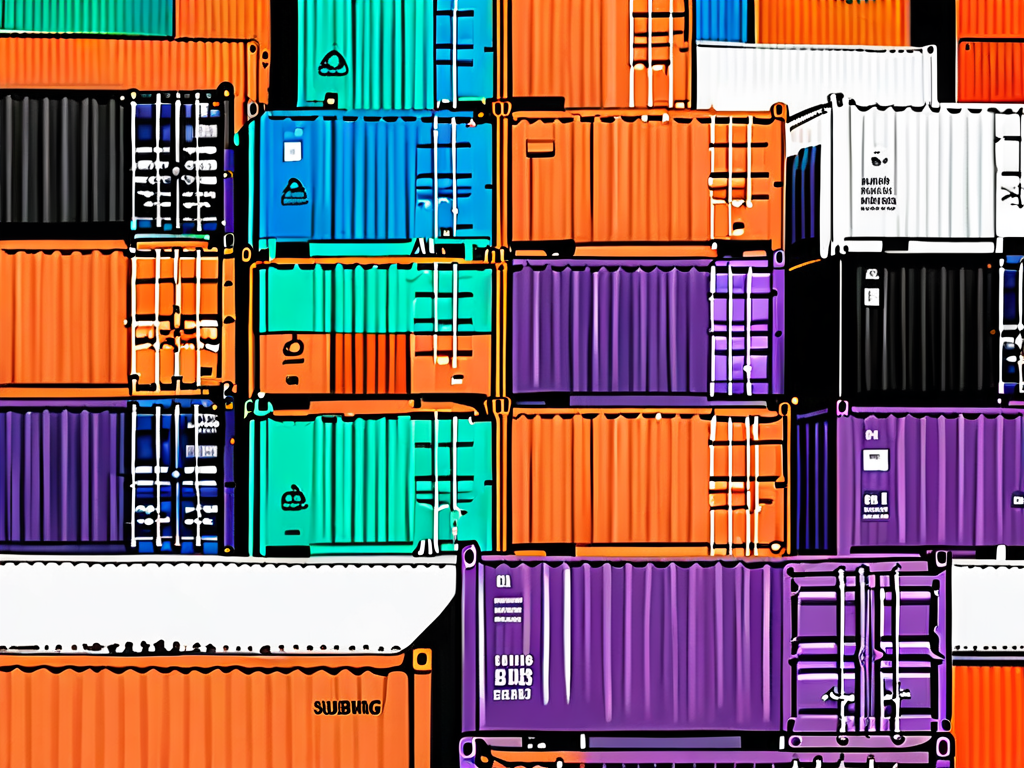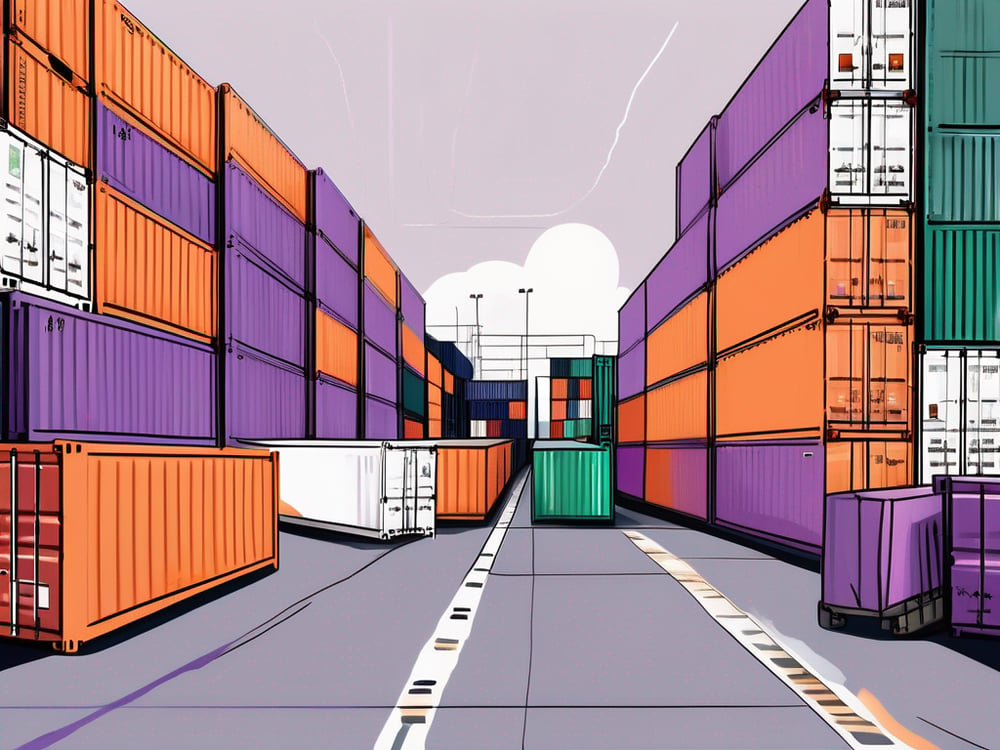Did you know that the shipping container industry has changed the world of global trade? These giant metal boxes have revolutionized the way goods are transported across continents, making them easier, faster, and more cost-effective than ever before.
But which company owns the largest number of shipping containers at the moment? Let’s dive in and find out
- Which company stands at the forefront of this industry
- What are the other companies near the top
- The shipping container industry in more detail
- The impact of ownership on the shipping industry
- Future trends in shipping container ownership
Table of Contents
ToggleTop 8 Companies with the Most Shipping Containers RANKED
When it comes to container ownership, the company that currently owns the most shipping containers is the Mediterranean Shipping Company (MSC), headquartered in Switzerland.
As of February 2024, MSC operates a fleet with a capacity of 5,705,424 twenty-foot equivalent units(TEUs) across 801 ships.
For businesses managing large-scale logistics, leveraging 3PL services in the USA can optimize supply chain efficiency and reduce operational costs.
Here is a full list:
- MSC: The industry leader with 5,705,424 TEUs
- Maersk: This Danish company manages 4,193,392 TEUs.
- CMA CGM: A French company with a total of 3,635,418 TEUs.
- COSCO Shipping Lines: Based in China, COSCO has 3,092,220 TEUs.
- Hapag-Lloyd: A German company with a fleet containing 2,004,030 TEUs.
- Ocean Network Express (ONE): This Japanese company manages 1,809,846 TEUs.
- Evergreen Marine Corporation: Based in Taiwan, they have 1,648,821 TEUs.
- HMM Co. Ltd.: A South Korean company with 797,327 TEUs
These companies dominate the industry, providing comprehensive shipping solutions worldwide, covering various routes, and offering services tailored to a wide range of cargo needs.
Their fleets vary in size and capability, ensuring a broad service coverage from standard container shipping to specialized logistics solutions.

What Is There to Know About the Shipping Container Industry?
The shipping container industry plays a crucial role in connecting economies and facilitating the exchange of goods on a global scale. Without shipping containers, the logistics of international trade would be arduous and inefficient.
These standardized metal boxes have allowed for standardization and optimization of the shipping process, making it possible to transport goods seamlessly from one part of the world to another.
Moreover, the design of shipping containers has evolved over the years to meet the demands of various industries. Specialized containers now exist for transporting perishable goods, liquids, oversized cargo, and even hazardous materials.
This versatility has further enhanced the efficiency and safety of global trade, ensuring that a wide range of products can be transported securely across oceans and continents.
The Role of Shipping Containers in Global Trade
Shipping containers act as the backbone of the global trade network, enabling the transportation of various goods, including electronics, automobiles, and other consumer products.
These containers provide a secure and efficient means of storing and shipping goods internationally. Without them, the costs of transporting goods would skyrocket, hindering economic growth and international cooperation.
Furthermore, the standardization of shipping containers has led to the development of advanced tracking and monitoring systems. These technologies allow companies to monitor the location, temperature, and condition of their goods in real-time, ensuring that they reach their destination in optimal condition.
This level of transparency and control has revolutionized supply chain management, reducing the risk of theft, damage, and delays.
Businesses seeking efficient international fulfillment services rely on global shipping container networks to ensure smooth cross-border logistics.
Key Players in the Shipping Container Market
Several companies dominate the shipping container market, each vying for a larger share of this lucrative industry. These companies, through their extensive container fleets, play a pivotal role in shaping the global logistics landscape. The competition is fierce, with each company striving to outpace its rivals in terms of container ownership and market share.
In addition to traditional shipping companies, new players have emerged in the market, offering innovative solutions such as smart containers equipped with IoT technology.
These containers can provide real-time data on factors like location, humidity, and shock levels, revolutionizing the way goods are transported and monitored. As technology continues to advance, the shipping container industry is poised for further transformation, ushering in a new era of efficiency and connectivity.
Understanding how to choose the right 4PL partner is critical when dealing with global supply chains and container logistics.
The Impact of Ownership on the Shipping Industry
Ownership of shipping containers can significantly influence the dynamics of the shipping industry, impacting both rates and efficiency. Let’s explore how ownership plays a role in shaping this field.
Ownership in the shipping industry goes beyond mere possession of containers; it extends to the strategic management and utilization of these assets. Companies that own a vast fleet of shipping containers not only have the advantage of scale but also the ability to innovate in container design and technology.
By investing in specialized containers for different types of cargo or implementing tracking systems for better inventory management, container owners can enhance their operational efficiency and offer unique value propositions to their clients.
How Ownership Influences Shipping Rates
The ownership of shipping containers allows companies to have greater control over pricing. Those with a sizable container fleet can negotiate more favorable rates, thereby gaining a competitive advantage. Additionally, efficient container management reduces the overall costs, enabling the owners to offer competitive shipping rates to their clients.
Moreover, ownership can lead to long-term partnerships with shipping lines and ports, securing preferential treatment and access to exclusive routes. This strategic positioning not only influences pricing decisions but also fosters collaboration for mutual growth and sustainability in the industry.
Learn how 3PL providers can help reduce logistics costs while maintaining efficiency in global shipping.
Ownership and Its Effect on Shipping Efficiency
The ownership of shipping containers directly influences the efficiency of the shipping process. Companies with a large container fleet can optimize their operations by strategically positioning containers in various locations, reducing empty transport movements, and ensuring a continuous flow of goods.
This ownership advantage translates into improved efficiency and streamlined logistics, resulting in faster and more reliable shipping services.
Furthermore, owning shipping containers empowers companies to implement sustainable practices in their operations. From utilizing eco-friendly materials in container construction to promoting container sharing to reduce carbon footprint, ownership can drive environmental stewardship in the shipping industry.
By prioritizing sustainability alongside efficiency, container owners can contribute to a greener and more responsible maritime sector.
Companies that invest in custom fulfillment solutions can optimize their shipping strategies, reducing transit times and increasing efficiency.
Future Ownership Trends
As the shipping container industry continues to grow, it’s crucial to examine the predicted changes in ownership patterns and the role technology plays in shaping future ownership.
Predicted Changes in Ownership Patterns
Experts predict that ownership patterns in the shipping container industry will undergo significant shifts in the coming years. As demand for containers rises, emerging market players are likely to enter the scene, challenging the dominance of traditional industry leaders.
This increased competition could drive innovation and further improvements in container quality and efficiency. One interesting aspect to consider is the potential impact of sustainability on ownership patterns.
As the world becomes more conscious of the environmental impact of shipping, there is a growing demand for eco-friendly containers. This demand could lead to a shift in ownership towards companies that prioritize sustainability, offering containers made from recycled materials or those designed to reduce carbon emissions.
This shift in ownership patterns not only aligns with global sustainability goals but also presents an opportunity for companies to differentiate themselves in the market.
The Role of Technology in Shaping Future Ownership
Technological advancements are poised to reshape ownership in the shipping container industry. With the advent of digital tracking systems, companies can better manage their container fleets, ensuring optimal utilization and minimizing losses.
Furthermore, the integration of Artificial Intelligence (AI) and Internet of Things (IoT) technologies will enable real-time monitoring and proactive maintenance of containers, reducing downtime and enhancing operational efficiency.
Another exciting development in technology is the potential use of blockchain in container ownership. Blockchain, with its decentralized and transparent nature, can revolutionize the way container ownership is recorded and verified.
By utilizing blockchain technology, companies can ensure secure and tamper-proof ownership records, reducing disputes and streamlining container transactions. This innovation has the potential to transform the ownership landscape, providing a more efficient and trustworthy system for all stakeholders involved.
Companies leveraging AI in logistics are gaining a competitive edge by streamlining shipping container operations with data-driven insights.
The Race for Container Supremacy Continues
As the shipping container industry continues to evolve, the quest for the largest container ownership remains fierce. The company that succeeds in owning the most shipping containers will not only secure its position at the top of the industry but also contribute to the growth and efficiency of global trade.
For businesses looking to optimize their shipping and fulfillment operations, Fulfyld offers tailored logistics solutions to streamline supply chains and enhance efficiency.
Exciting changes lie ahead, and the competition between container giants will undoubtedly shape the future of this vital industry.






